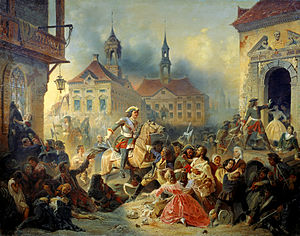Battle of Narva (1704)
| Battle of Narva | |||||||
|---|---|---|---|---|---|---|---|
| Part of the Great Northern War | |||||||
|
Peter the Great leads the Russian troops capturing Narva in 1704 |
|||||||
|
|||||||
| Belligerents | |||||||
|
|
|
||||||
| Strength | |||||||
| 3,800 infantry and 1,300 cavalry | 20,000 | ||||||
| Casualties and losses | |||||||
| 3,200 dead or wounded 1900 captured | up to 3,000 dead or wounded | ||||||
The Battle of Narva was the second Russian siege of Swedish Narva during the Great Northern War, resulting in the capture of the town by Russia on 9 August 1704, and the subsequent massacre of some of its Swedish inhabitants.
Four years after the first battle of Narva, Tsar Peter I marched again to the area with a reorganized army in an attempt to capture Narva and occupy Ingria, previously a Swedish logistical center. Marshal Boris Sheremetev's force of 20,000 captured Tartu on 24 June. Sheremetev then besieged Narva, with the garrison under the Commandant Major-General Henning Rudolf Horn af Ranzien and consisting of only 3,800 infantry and 1,300 cavalry. After a long siege followed by a three-fronted attack the Russians captured Narva on 20 August 1704, massacring hundreds of its Swedish garrison and inhabitants before Peter I stopped them. General Horn, several officers and a large number of Swedish soldiers were captured, after roughly 3,200 casualties in the siege and aftermath. The Russians lost up to 3,000 men in total. On 11 September, citizens of Narva swore allegiance to Peter I in the courtyard of the town hall. The city was incorporated into the Russian Tsardom.
In August, Peter I signed the Treaty of Narva in the town.
...
Wikipedia

